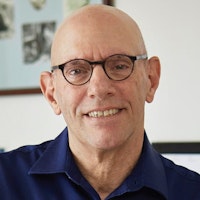When we’re cracked open, we’re shown the tender fact that we’re all in this together. In that naked moment, we’re humbled and awed by the forces of grace that are always present, waiting to heal our heart.
Mark Nepo

In This Together
Topic: Overcoming Adversity
When we’re broken open, we’re forced to face what we’ve refused to look at. When we’re undone by the whirlwind of our own or another’s pain, we bear witness to the truth that life is far beyond our control. And when we’re cracked open, we’re shown the tender fact that we’re all in this together. In that naked moment, we’re humbled and awed by the forces of grace that are always present, waiting to heal our heart. And in that terrifying instant, we’re given a taste of eternity, where separation has no meaning… In being cracked open, we’re also shown our kinship with all beings who have ever suffered.
Mark Nepo was born on February 23, 1951, in Brooklyn, New York, and has dedicated over four decades to intertwining poetry and spirituality. With a PhD in English, he embarked on a teaching career at the State University of New York at Albany that spanned twenty years. His upbringing in New York infused his work with a blend of urban wisdom and a quest for deeper truths, setting the stage for his contributions to literature and spiritual thought.
The turning point in Nepo’s life came with his battle against lymphoma in his thirties, profoundly shaping his worldview and creative output. This experience led to significant works like "The Book of Awakening," offering meditations on the essence of life. His writings, including "Seven Thousand Ways to Listen," "Reduced to Joy," and "Inhabiting Wonder," delve into the complexities of human experience, advocating for a life lived with depth and mindfulness.
Now residing in Kalamazoo, Michigan, Nepo continues to influence through his books, workshops, and lectures. His journey reflects a commitment to resilience, deep listening, and openness, guiding others to navigate life’s challenges with grace. Nepo’s work serves as a beacon for those seeking to engage more fully with the world and their inner selves, embodying the journey towards authenticity and understanding.
The Book of Awakening
Nepo, Mark. The Book of Awakening. Conari Press, 2011.

Mark Nepo
Theme: Adversity

About This Mark Nepo Quotation [Commentary]
When Mark Nepo writes, “When we’re broken open,” he begins with what adversity can bring to the surface: we’re “forced to face what we’ve refused to look at.” When we’re “undone by the whirlwind of our own or another’s pain,” we “bear witness to the truth that life is far beyond our control.” The order is direct—broken open, forced to face, undone, and then a clear seeing of what we cannot manage.
From there, “when we’re cracked open,” we’re “shown the tender fact that we’re all in this together.” Nepo calls it a “naked moment,” and in that exposure we’re “humbled and awed by the forces of grace that are always present, waiting to heal our heart.” Grace is not portrayed as distant or rare, but “always present,” “waiting,” and able to meet us right where we are.
Nepo then adds, “in that terrifying instant,” we’re “given a taste of eternity, where separation has no meaning.” This does not remove pain, but it can change what pain reveals. “In being cracked open,” he says, we’re also shown “our kinship with all beings who have ever suffered.” In adversity, the heart may feel torn, yet Nepo keeps pointing to what becomes visible: togetherness, grace “waiting to heal,” and kinship that reaches beyond our usual sense of separation.
Additional Mark Nepo Quotations
Related Quotes
Copyright © 2017 – 2026 LuminaryQuotes.com About Us